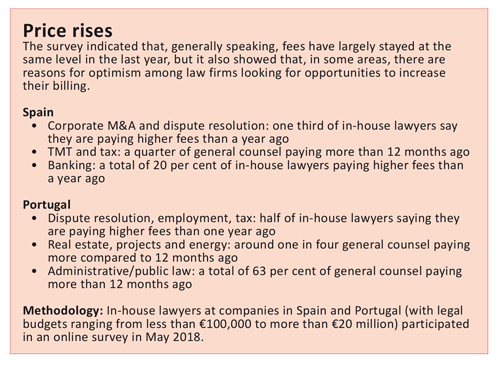More liquidity

 A significant number of in-house legal departments in Iberia are paying more for legal services than they were a year ago, but if law firms want to earn even higher fees, they must improve their understanding of their clients’ business
A significant number of in-house legal departments in Iberia are paying more for legal services than they were a year ago, but if law firms want to earn even higher fees, they must improve their understanding of their clients’ business
Bullishness among corporate and litigation lawyers in Madrid about law firms’ ability to increase the fees they charge seems to be justified, with a survey suggesting that a third of clients are paying more for corporate and dispute resolution advice than they were one year ago. Research conducted by Iberian Lawyer reveals that one in three in-house lawyers in Spain say they are now paying more for corporate and dispute resolution advice than they were 12 months ago. Meanwhile, a quarter say they are paying higher fees for tax advice, while one in five are paying more for banking and finance-related legal services.
The picture is a little more mixed in Portugal, though there are still reasons for law firms to be optimistic that there are more opportunities for them to increase revenue and profitability. Half of in-house lawyers in Portugal are paying more for dispute resolution and tax advice, while a quarter are paying more for real estate and projects and energy-related legal advice. However, what will be of concern for law firms is that our survey showed a third of in-house lawyers in Portugal are paying less for corporate and M&A advice than they were a year ago.
Overall, the general conclusion from the survey was that legal fees across the vast majority of practice areas were largely unchanged in Spain and Portugal compared to one year ago. However, there were certain areas where there was a noticeable trend for clients to pay more for legal services. For example, 32 per cent of in-house lawyers in Spain said they were paying external lawyers higher fees for corporate and M&A advice compared to a year ago, with only 13 per cent saying they were paying less. The same proportion said they were paying more for dispute resolution advice, with only 12 per cent saying their fees had been reduced.
A total of 25 per cent of in-house lawyers in Spain said they were paying more for tax-related advice, with only 7 per cent saying their fees had been reduced in the last year. Meanwhile, 20 per cent of respondents in Spain said they were paying more for banking and finance work, with not a single in-house lawyer saying they were paying less for legal services in this area. A total of 28 per cent of respondents in Spain said they were paying higher fees for technology, media and telecommunications (TMT) legal work, with just 6 per cent saying they were paying less.
With regard to in-house lawyers in Portugal, a massive 51 per cent say they are paying more for dispute resolution advice than they were a year ago. Meanwhile, only 12 per cent said they were paying lower fees in this area. Nearly half (45 per cent) of respondents in Portugal said they were paying higher fees for tax advice, with not a single in-house lawyer saying their fees had been reduced. A total of 45 per cent also said they were paying higher fees for employment-related advice, with only 11 per cent saying they were paying less. Nearly two-thirds (63 per cent) said they were paying more for administrative/public law advice, with only 12 per cent saying they were paying less.
Cause for concern
The alarming news for law firms in Portugal is there seems to be a noticeable trend of clients paying less for corporate and M&A advice. A total of 37 per cent of in-house lawyers in Portugal said they were paying lower fees for legal services in this area, with only 13 per cent saying they were paying more. Meanwhile, 25 per cent said they were paying lower fees for banking and finance-related advice, with only 13 per cent saying they were paying more.
The survey suggests that, in order to be able to charge higher fees for their services, law firms need to develop a better understanding of their clients’ business. This was frequently mentioned by respondents as one of the key ways in which law firms could convince clients to pay more. “Law firms need to provide a better service, be more trustworthy and know the business better,” said one in-house lawyer in our anonymous survey. Another remarked that law firms need to be “more efficient and much more in line with clients’ needs”, while one said law firms should have a “business-focused approach”. It was also suggested that having an in-depth understanding of a client’s business would also make the client less likely to recruit in-house lawyers and instead rely on the expertise of the external lawyer.
Other ways in which law firms could persuade clients to pay more for their services include improving the “scope and quality of the services provided”, according to one respondent. Survey participants also called on firms to show more dedication towards their clients and also more clearly demonstrate how they are adding value for the client.
The good news for law firms is that over a third (38 per cent) of in-house lawyers in Spain and Portugal say their organisation’s budget for expenditure on legal services is bigger than it was a year ago, with 9 per cent saying it is more than 50 per cent bigger. Of those who say their budget is bigger, 92 per cent say it is because their organisation has a “greater need for external legal advice”, with the remaining 8 per cent saying it is because “law firms are increasing their fees”.
However, it should also be noted that 37 per cent of respondents said their legal budget was smaller than a year ago – of these, 50 per cent said it was smaller because their organisation “has less money than it did previously”, but 36 per cent said it was because their in-house legal team was bigger and they had less need for external advisers. However, on a positive note for law firms, the majority of in-house lawyers in Iberia (56 per cent) say they are outsourcing more work than they did a year ago.
The survey also indicates that talk of the death of the billable hour may be premature. While 49 per cent of in-house lawyers said a smaller proportion of their budget was spent in the form of hourly rates compared to a year ago, 14 per cent said a bigger proportion of their budget was being spent in the form of hourly rates. One in four survey participants said more than 40 per cent of their budget was spent in the form of hourly rates.
The upturn in the economy means there is less pressure on fees than there was a few years ago, argues Ashurst managing partner María José Menéndez. “Clients are sophisticated and they only accept fees that are commensurate to the added value provided by the firm, which means legal fees may be going down with respect to commoditised services, but fees are not being reduced on higher-end legal services,” she adds. Menéndez adds that in order to persuade clients to pay more for legal services, law firms need to provide a “top quality service not only with regard to technical legal advice and the intelligence, dedication and quality of the professionals acting for them, but additionally offer complimentary perks such as training, updates and briefings, as well as having a ‘partnership’ attitude to the client’s handling of its legal matters and in-house team management”. According to Emilio Martínez, COO of Cuatrecasas, the key to enticing clients to pay higher fees is simply “delivering high-end work with added value”.
Nuno Galvão Teles, managing partner of Lisbon-headquartered MLGTS, says prices are increasing for “highly sophisticated and value-added work in which the quality, commitment and client-lawyer partnership are of the essence, but decreasing for more commoditised work”. He adds that law firms will be able to charge higher fees if they are more innovative in the way they provide legal services. “This means addressing the clients’ problems and coming up with new solutions that most often involve the use of technology and data, for example through fine-tuned project management with lawyers increasingly working alongside IT suppliers and data analysts.” It seems that, for those law firms that comprehensively re-think their service offering, the potential exists to earn greater rewards for the work they do.













